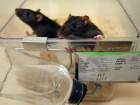By Zoe Demarco
Scientists say that they have found evidence that an already-celebrated vitamin can stop the aging process of organs in mice. It could also have the potential to treat degenerative diseases in humans.
Called nicotinamide riboside (NR for short), the vitamin was given to elderly mice. Compared to their non-vitamin taking counterparts, the mice were better able to regenerate their muscles and organs. They also lived longer.
The study was published Thursday in the journal Science.
As humans, mice, and other mammals age, our muscles and organs are less able to regenerate and repair themselves when they’re damaged. This leads to many common age-related disorders, according to Medical Xpress.

The scientists, from Switzerland, Brazil, and the University of Ottawa, first looked at how mitochondria change with age. Mitochondria, often called the “powerhouse of the cell,” are the parts that keep it full of energy. The scientists found that the mitochondria’s ability to function properly was important for stem cells — the cells responsible for regeneration — to stay healthy as well.
“We demonstrated that fatigue in stem cells was one of the main causes of poor regeneration or even degeneration in certain tissues or organs,” Hongbo Zhang, one of the authors of the study, told Medical Xpress.
This is where nicotinamide riboside comes in. It’s a precursor to a molecule called nicotinamide adenine dinucleotide (NAD+ for short), which helps mitochondria function.
So, basically, nicotinamide riboside helps to form NAD+. NAD+ keeps the mitochondria working. The mitochondria keeps stem cells healthy. And stem cells help our organs to regenerate.
NR is closely related to heart-healthy vitamin B3. Other studies have shown that it has the ability to boost metabolism and has the same regenerative abilities on the brain and skin cells.
“This work could have very important implications in the field of regenerative medicine,” said Johan Auwerx, head of the study. “We are not talking about introducing foreign substances into the body but rather restoring the body’s ability to repair itself with a product that can be taken with food.”
While the study produced no negative side effects in the mice, the regenerative effects apply to all cells, even harmful ones such as those that cause dementia. Further studies are planned, said Medical Xpress.




